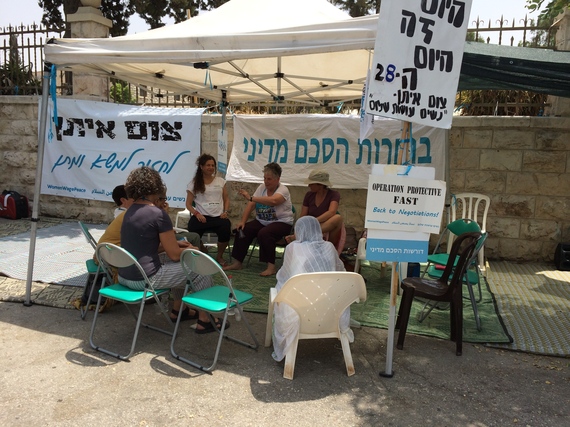Jewish and Palestinian women have begun a joint series of twenty-five-hour and fifty-hour to persuade political leaders to find a nonviolent solution to the Israeli-Palestinian conflict.
Citing Liberia and Lysistrata, the organizers of WomenWagePeace.org.il reached a breaking point during last summer's war in Gaza.
The murder of three American teens at the hands of Palestinians, along with a retributory killing by Israeli Jews of a Palestinian boy, set in motion Operation Protective Edge, which led to thousands of deaths.
They call their mission Operation Protective Fast, a sly rebuttal to the military operation of the previous summer.
"What we want first and foremost is an end to the process of killing and being killed," Noa Vos, a psychologist working in the low income Bat Yam neighborhood of Tel Aviv, said.
"Everything else follows from that. The first thing we want to do is stop the killings."
The women have been gathering in an open-air tent outside the Jerusalem residence of Israeli Prime Minister Binyamin Netanyahu, inviting motorists and passersby to sit in their circle and talk about waging peace.
"We know the prime minister has seen us," said Dorothy Kertesz, a member of the group who lives nearby and hosts fasting women from outside Jerusalem. "We've seen him go by in his car in the mornings, but he hasn't stopped to talk with us."
Many in Israel doubt the effectiveness of a group of women seeking a peace accord where men have failed for decades.
All it takes, they say, is an extremist on either side to destroy any hope for peace.
Nevertheless, the women of Women Wage Peace point to history, both recent and ancient, to bolster their cause.
"In Liberia fifteen years ago," another woman said, "there was a war in which adolescents were killing and raping.
"One woman from one of the tribes reached out to a woman in the opposing tribe. Their talking led to a larger and larger group of women taking part in discussions, and eventually a peace settlement was achieved.
"If they can do that in Liberia, surely we can do the same thing here."
The women also cite the ancient Greek comedy Lysistrata, in which women on opposing sides of a similarly never-ending war committed to stop having sex with their men until they agreed to stop fighting. Their Priapistic agony made for great entertainment back in the day of Aristophanes, although they haven't yet tried this tactic, the leaders say.
A visitor last week to the tent was Dr. Izzeldin Abuelaish, a Harvard-trained Egyptian doctor who was born in a Gaza refugee camp and who lost three daughters, with a fourth suffering serious injury, during the recent Gaza war.
Doctor Abuelaish offered the women his support and spoke very encouragingly of their efforts to create a new model of negotiation, which would actually include the voices of women and not just male politicians who have been dominating war counsels for decades. Currently, with the focus on the proposed Iran accord, there are no Israeli-Palestinian peace talks taking place.
Instead, politicians and journalists today discuss the concept of "containing the conflict."
In the absence of the true statesmanship required to resolve matters, the best that can be hoped for, under this model, is limiting the eventual flare-ups that lead to war.
For the women who wage peace, containment is inadequate.
"This is not why we worked so hard to create a Jewish state," said another woman.
"You have no idea what it's like to be a mother in this country. If the men can't establish peace, then we should be at the table. It's time our voices were heard."

